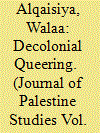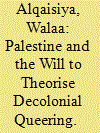| Srl | Item |
| 1 |
ID:
161104


|
|
|
|
|
| Summary/Abstract |
This article analyzes the work of Palestine's most established queer rights organization, alQaws for Sexual and Gender Diversity in Palestinian Society, to reveal the political power of being queer in Palestine. It argues that an open, feminist, queer space such as alQaws is a productive site to think and practice decolonization. Relying on the author's direct involvement with the group, the article traces the development of queer Palestinian thought to provide a critique of queer politics in Palestine: it recounts how since the establishment of the organization in 2001, alQaws activists have increasingly transcended exclusivist gay identifications and rejected singling out sexuality as a discrete site of oppression disconnected from Zionist settler colonialism. The discussion covers Israeli pinkwashing and its counter, Palestinian pinkwatching; it deconstructs pinkwashing narratives, rejects the myth of the colonial savior, and reveals how discourses of sexual progress reproduce Zionist colonialism. It also documents alQaws's challenge to normalizing development discourse.
|
|
|
|
|
|
|
|
|
|
|
|
|
|
|
|
| 2 |
ID:
173951


|
|
|
|
|
| Summary/Abstract |
This article posits a theorisation of decolonisation in relation to queer as it emerges from the settler-colonial context of Palestine, what I call decolonial queering. The first part provides a new reading of Zionist settler-colonialism, which I define as hetero-conquest. Its novelty lies in refocusing the question of colonialism in native grounded knowledge of queering, while showing the limitations of those existing studies whose frames emanate mainly from American and/or global north contexts of racism and homo-nationalism. By tracing the contemporary continuity of hetero-conquest in Palestine, the second part unpacks the need for a radical theory of liberation that weaves decolonization into queer. Bringing Sara Ahmed and Frantz Fanon into dialogue, such a theory emanates from the amalgam of histories, geographies and bodies, whose restoration beyond the strictures of hetero-conquest opens the way for a radical multi-scalar politics of liberation.
|
|
|
|
|
|
|
|
|
|
|
|
|
|
|
|